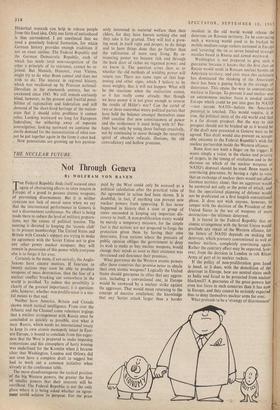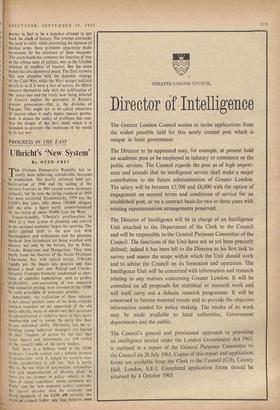THE NUCLEAR FUTURE.
Not Through Geneva
By WOLFRAM VON RAVEN
THE Federal Republic finds itself accused once again of obstructing efforts to relax tension in Europe, of a greed to possess atomic weapons, of preventing disarmament. But it is neither cynicism nor lack of moral sense when we say that the international performance in Geneva is not a disarmament conference. No effort is being made there to reduce the level of military prepara- tions, nor the causes of political tension. The meeting is devoted to keeping the 'atomic club' to its present membership 7 The United States and Britain with Canada's support are trying to make an agreement with the Soviet Union not to give any other power nuclear weapons; they will remain in possession of this power while everyone else is to forgo it for ever.
Certainly in the main, if not entirely, the Anglo- Saxons' have sincere motives. If fourteen to 'twenty nations may, soon be able to produce weapons of mass destruction, then the fear of a nuclear conflict breaking out somewhere in the world is justified. To reduce this possibility is clearly of the greatest importance; it is question- able, however, whether non-proliferation is a use- ful means to that end.
Neither have America, Britain and Canada shown much tactical intelligence. From over the Atlantic and the Channel come vehement urgings that a nuclear arrangement with Russia must be concluded as quickly as possible, cost what it may. Russia, which needs no international treaty to keep its own atomic monopoly intact in East- ern Europe, is bound to conclude from this eager- ness that the West is prepared to make imposing concessions and this atmosphere of hasty wooing was underlined for the Kremlin when it became clear that Washington, London and Ottawa did not even have a complete draft to suggest but had to work out a common initiative when already at the conference table.
The more disadvantageous the tactical position 'of the big Western powers, the greater the fear of smaller powers that their interests will be sacrificed. The Federal Republic is not the only place where it is being asked whether an agree- ment could achieve its purpose. For the price
paid by the West could only be assessed as a political calculation after the practical value of • the agreement in action had been shown. It is -doubtful, in fact, if anything can prevent new nuclear powers from appearing. It has never happened in histor'y that a state or group of states succeeded in keeping any important dis- covery to itself. Anon-proliferation treaty would be merely a temporary measure, for the simple fact is that nations are not prepared to forgo the protection given them by having their own
• deterrents. Even nations where the pressure of public opinion obliges the government to deny its wish to make or buy nuclear weapons, would change their minds as soon as their existence was threatened and denounce their promises.
What guarantee do the Western atomic powers offer those countries that promise never to obtain their own atomic weapons? Logically the United States should guarantee its allies that any aggres- sion, including a conventional one, in Europe would be answered by a nuclear strike against the aggressor. That would mean returning to the concept of massive retaliation; the knowledge that any Soviet attack larger than a border incident in the old world would release the deterrent on Russian territory. To be convincing such a warning would need to be backed by mobile medium-range rockets stationed in Europe and `covering' the six or seven hundred strategic missiles based in Russia and aimed westward.
Washington is not prepared to give 'such a guarantee because it knows that the first shot on Russia would result in Russian nuclear bombs on American territory, and ever since this stalemate has dominated the thinking of the Americans there has been a gaping hole in the strategy of deterrence. This opens the way to conventional warfare in Europe. To prevent it and nuclear war an autonomous nuclear force is needed inside Europe which could be put into gear by NATO —not outside NATO—before the American potential is touched. This would require, it is true, the political unity of the old world and that is a far distant prospect. But the way to this prospect should not be bricked up as it would be if the draft now presented in Geneva were to be agreed. That draft would also prevent an accept- able outcome to the Federal Republic's wish for nuclear partnership inside the Western alliance.
Bonn does not want a finger on the trigger. It wants simply a voice; in the choice and priority of targets, in the timing of retaliation and in the decision on which of the nuclear weapons at NATO's disposal should be used. Bonn wants a convincing guarantee, by having a right to vote, that an exchange of nuclear shots would not affect German territory alone; that an aggressor would be answered not only at the point of attack, and that the operational planning of defence would not be predicated on a first longish conventional phase. It does not wish anyone, however, to tamper with the decision of the President of the United States in the use of weapons of mass, destruction—the ultimate deterrent.
It is feared in the Federal Republic that an atomic arrangement with the Soviet Union would preclude any repair of the Western alliance, for the future of NATO depends on making the deterrent, which prevents conventional as well as nuclear warfare, completely convincing again. Rather the contrary effect may be expected, how- ever, from the decision in London to rob Rhine Army of part of its nuclear rockets.
If the policy of non-proliferation goes hand in hand, as it does, with the demolition of the deterrent in Europe, how are neutral states such as India and Israel to be protected from nuclear blackmail?,A guarantee of the great powers has even less force in such countries than it has now in Europe, and they cannot be seriously expected thus to deny themselves nuclear arms for ever.
What pretends lobe a `strategy of disarmament'
Proves in fact to be a ,hopeless attempt to put back the clock of history. The attempt overlooks the need to solve, while preventing the increase of nuclear arms, those problems apparently made Permanent by the existence of these weapons. The atom bomb has removed the function of war as the ultimo ratio of politics, war as the forcible solution of conflicts of interest. But the atom bomb has also destroyed peace. The East answers this new situation with the dynamic strategy of the Cold War, while the West accepts political Paralysis as if it were a fact of nature. Its efforts concern themselves only with the stabilisation of the status quo and the treaty now being debated at Geneva implies the guarantee of Russia's Present possessions—that is, the division of
Europe. This ought not to be called relaxation of tension when it really makes tension perma- nent. It denies the reality of problems that con- tain the danger of the very result which it is intended to prevent—the explosion of the world in its last war.



































 Previous page
Previous page